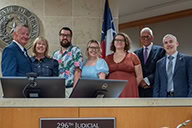
WEST LAFAYETTE, Ind. — Nelson A. Locke’s admission to the Texas bar wasn’t just the culmination of a personal quest but a victory of persistence that could pay off for others. Locke was sworn in July 24 by Judge John Roach Jr. at the Collin County Courthouse in McKinney, Texas.
His odyssey may help pave the way for other nontraditional law school graduates to be admitted to practice in Texas.
“This ceremony marked the final step in a four-year journey to bar admission in Texas,” Locke said. “It confirmed the fact that the Texas Supreme Court found my legal training and performance acceptable. I am the result of the outstanding education I received at Purdue Global Law School. Now it’s on to the next challenge.”
For Locke, of Plano, Texas, becoming a lawyer was not a career he anticipated pursuing for the first 50-plus years of his life. The U.S. Marine veteran and former retail executive was enjoying a successful career as a mortgage industry entrepreneur until he became frustrated by regulations he found confusing and unjustly applied, and he decided to go to law school.
In 2005, Locke enrolled part time in Purdue Global Law School (previously known as Concord Law School), the nation’s first fully online law school. Locke pursued his legal education diligently, often studying four to five hours a night while running his mortgage company full time.
He graduated in 2011 and, in 2013, passed the California bar exam and founded his law practice.
In 2014, Locke moved his family to Texas and built a thriving national law practice focused on federal mortgage compliance, with clients in 26 states.
In 2021, Locke sought admission to the Texas bar by motion — a process typically available to attorneys who have practiced for at least five years in another jurisdiction.
However, the Texas Board of Law Examiners (TBLE) denied his application, citing their view that Texas’ rules prohibited admission of graduates of online law schools. The American Bar Association will allow a campus-based law school to offer an online program but will not yet allow a fully online law school to pursue ABA approval.
Undeterred, Locke embarked on a multiyear journey. In 2022 and 2023, he was again rejected by the TBLE twice — with the TBLE shifting its reasoning from an outright ban on online education to questioning whether Locke’s legal practice was exclusively federal due to his serving some California clients.
The turning point came in early 2024 when Locke’s team petitioned the Texas Supreme Court, requesting an administrative review of the TBLE’s previous decisions and their interpretations of Texas’ bar admission rules.
On May 6, 2025, the Texas Supreme Court issued an order ruling in Locke’s favor, finding that he should have been granted a waiver to be admitted notwithstanding having attended an online law school.
Pritikin said Locke’s advocacy and the detailed information provided about Purdue Global Law School will likely inform the Texas Supreme Court’s thinking as it considers moving away from relying exclusively on ABA approval as its criteria for eligibility for bar admission upon graduation.
Moving forward, Locke plans to continue expanding his legal practice, serving his 250-plus clients across the country. He also intends to advocate for other online law graduates facing similar hurdles in their pursuit of licensure, particularly as the Texas Supreme Court currently reviews the state’s bar admission rules.
Read more of Locke’s story.